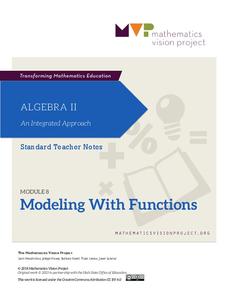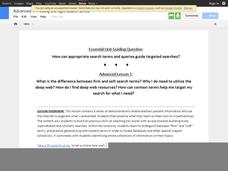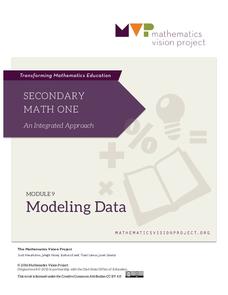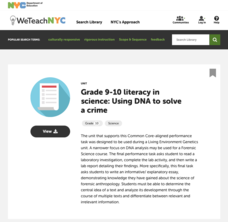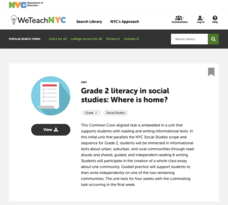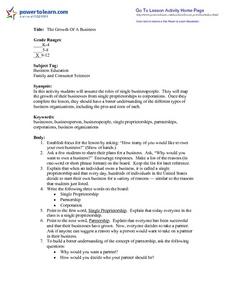Curated OER
Types of Entrepreneurs
What does it take to be an entrepreneur? What traits does a person need? Find out as you and your class brainstorm along with this presentation. The traits of inventors, types of entrepreneurs, and their role in the economy are...
University of Wisconsin
Identifying Your Soil for Rain Gardens
Teach your class the descriptive characteristics of soil. Provide information about particle size and a flow chart for assessing texture. Soil scientists then analyze samples and hypothesize which would be the best type for a rain...
University of Wisconsin
Infiltration Test: Exploring the Flow of Water Through Soils
Soil scientists gain experience with an infiltrometer can to determine the infiltration rates at different locations on campus. If you are using the entire unit, the class has already analyzed water flow and soil types, so they should...
Curated OER
Mixed Bags: Fiction and Nonfiction
The second in a series of three lessons from Scholastic comparing and contrasting fiction and nonfiction, this activity requires learners to read, write, and compare two books independently. After briefly reviewing the features of...
American Physiological Society
Sticky Adaptations A Lesson on Natural Selection
Now you see it, now you don't! The stick bug exhibits the ability to disappear into a wooded environment. Why does this adaptation manifest in some species, but not in others? Life science students explore animal adaptations in nature...
Government of South Australia
Don't Waste Your Energy
Don't lift another finger, this physical and environmental science unit has everything you need to begin teaching your class about energy. Starting with a look at the greenhouse effect, these lessons and activities take young scientists...
Rural Science Education Program
Bees and Flowers – Partners in Pollination
Why are bees so important? After several activities where kids investigate the form and function of flowers, they learn about the different types of bees and label them. They then examine pollen under a microscope and decide which bees...
Mathematics Vision Project
Module 7: Modeling with Functions
The sky's the limit of what you create when combining functions! The module begins with a review of transformations of parent functions and then moves to combining different function types using addition, subtraction, and multiplication....
Mathematics Vision Project
Module 8: Modeling With Functions
Sometimes there just isn't a parent function that fits the situation. Help scholars learn to combine function types through operations and compositions. Learners first explore a new concept with an introductory activity and then follow...
Curated OER
Regarding the Fountain: A KWHL Strategy
A KWHL strategy prepares young readers for the different type of writing found in Kate Klise's story of the Dry Creek Middle School drinking fountain. Step-by-step directions, student and teacher copies of the KWHL template, and...
Mathematics Vision Project
Module 9: Statistics
All disciplines use data! A seven-lesson unit teaches learners the basics of analyzing all types of data. The unit begins with a study of the shape of data displays and the analysis of a normal distribution. Later lessons discuss the...
Curated OER
John Lennon
Here is a great example of the type of biographical presentation your class could create. They can view this informational biography of John Lennon to learn about a famous person or as inspiration for a research project. Each slide...
University of Wisconsin
Bimodel Botany Bouquet
Gardeners are given an individual plant specimen from a bouquet of local rain garden plants. They group up by their plant type and then make observations together, name the plant, and introduce it to the rest of the class. You then share...
Google
Advanced 1: Picking the Right Search Terms
Many people, when searching online, will type in what they are looking for without much thought. But what's the next step, if they don't get the desired results? Careful selection of search terms. Your class can develop a sense for...
Mathematics Vision Project
Features of Functions
What are some basic features of functions? By looking at functions in graphs, tables, and equations, pupils compare them and find similarities and differences in general features. They use attributes such as intervals of...
Mathematics Vision Project
Modeling Data
Is there a better way to display data to analyze it? Pupils represent data in a variety of ways using number lines, coordinate graphs, and tables. They determine that certain displays work with different types of data and use two-way...
American Physiological Society
Sit On It
How do product designers come up with the variety of things we see in stores and on TV every day? They identify a need, then create something that meets that need. Sounds simple, right? A two-week instructional activity puts seventh...
New York City Department of Education
Grade 9-10 Literacy in Science: Using DNA to Solve a Crime
Scholars become detectives and use science to solve a crime! A complete unit introduces DNA and includes hands-on activities that have learners model DNA and extract it from different food types. A culminating activity challenges...
New York City Department of Education
Grade 2 Literacy in Social Studies: Where Is Home?
What makes a community? How communities differ? Young scholars research different types of communities, small rural towns, and large crowded cities. They respond to writing prompts, and write essays in groups to understand the wide...
American Museum of Natural History
What's This?: Early Humans
Early humans crafted shelters out of whatever materials they could find. A one-question quiz asks learners to identify the type of bones used to construct the hut pictured in a display.
Curated OER
The Growth Of A Business
Students explore the growth of businesses from single proprietorships to corporations. They compare and contrast single proprietorships, partnerships and corporations. In closing, students explore the pros and cons of each type of...
Curated OER
The Three Forms Of Business
Eleventh graders identify and define, in writing, the three forms of business organizations. After a lecture/demo, 11th graders complete an assignment that's imbedded in this plan. They discover the advantages, and disadvantages, of each...
Curated OER
Alike and Different
Second graders listen to a book about how farms feed the world. They discuss elements of rural life. They listen to a story about the suburbs and discuss elements specific to a suburban community. They listen to a story about city...
Curated OER
Word Association Poetry with Visual Thesaurus (or Not)
Young poets get inspiration and guidance for making word association poems with the Visual Thesaurus. Your class could complete this project with nothing more than a pencil and paper as well. A nice one-off for a substitute during your...










